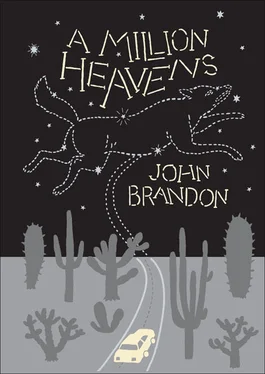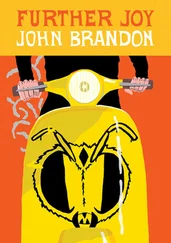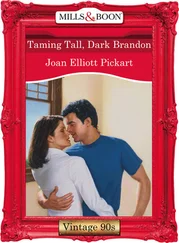The gas station owner hadn’t moved in a week. He’d found water gurgling down a cliff face and had stayed with it as long as he could, burning up seven of the forty days he was going to stay in the desert, but now the trickle had petered out altogether. He had come across a roofless hunters’ cabin two mornings after leaving Lofte and had found a jar of sweet pickles in a cabinet. The day after that he’d crossed some kind of old fire road, free of tire tracks but still edged with shin-high berms. But then this spot — he knew it would be the last easy place. There would be narrow canyons with puddles hidden in their troughs. There would be cacti with moist flesh. Rain, with any luck. The desert was asking him to bow out now. He was being tempted, like someone from a Bible desert. Tempted to give up his journey.
He wasn’t going to bow out. In the morning he would leave here and wander not in the direction of the basin towns and not in the direction of Albuquerque. He would wander toward nothing. He would find some other water, and some other water after that, or he would not.
He’d killed and eaten a crow, and that was the only action he’d taken so far that felt right, that felt like real engagement. He’d leveled his pistol and intentionally winged the stupid bird. Then he’d gotten a grasp and broken its neck and plucked it and cleaned it in the pure trickle and roasted it over his fire. It was more work than it was worth, but it felt right. It was an action that had startled the desert, that had announced his presence.
He looked out from his half-assed grotto, which gave him shade mostly when he didn’t need it, late in the day, and the far-off mountains appeared to be crumbling. The mountains he could barely see, veiled in the blue dust of distance — that’s where he would survive or perish, where he would find himself in a type of straightforward peril men had found themselves in since the beginning of time.
He had decided maybe it wasn’t a great idea to have Gee keep coming up to the clinic room. Something was wrong and he wasn’t interested in figuring out whose fault it was because it was probably his. He hadn’t told Gee any of this and had been avoiding her calls. He wasn’t sure how to proceed. Everything was his fault. Doctor Raymond had come in that morning to flash his penlight in Soren’s eyes as he did every week and then listen to his chest and declare with astonishment, as he did every week, that Soren still didn’t need a tracheotomy. Soren’s father had asked him exactly what he was looking for with the light and when the doctor said he was watching for any changes, Soren’s father cut him off and said there weren’t any damn changes and that was obvious and if it was really necessary to keep shining a bright light in the kid’s eyes and making useless checkmarks on a useless clipboard then could the doctor come do that when Soren’s father wasn’t around?
“But you’re always around,” said the doctor.
“I didn’t say it would be easy,” said Soren’s father.
Now Soren’s father felt bad about that. He wasn’t upset at the doctor. He was upset because he saw he had to face Soren’s situation alone. It was one of those things. There were four walls where Soren’s father lived and a wasteland out the window, and Soren’s father had to figure out how to do the time alone. He had to make peace with the beeps and cycling hums of the machines that monitored Soren. He had to make peace with the clinic food, which he now knew was terrible. He had to make peace with his son’s sallow, sinking face. He did not need to be leading on some woman who was too good for him anyway. He wasn’t with the living. He wasn’t with the living and he wasn’t where his son was.
He took magazines into his hands and he remembered to brush his teeth and clip his nails, and he reminded himself that Soren, if and when he woke up, would need him. He saw Gee’s weird roadrunners in his mind’s eye. On vigil nights, he closed the blinds tight and flipped off the lamp. He did not want to offer the remaining vigilers any encouragement. Before, when his son had been healthy, Soren’s father had been happy and the vigilers had been miserable, and now these people were using his son to try and find peace. There were a few left who refused to quit. They didn’t want Soren to wake up. They didn’t want anybody to be happy.
Something was wrong with her body. Her body was against her, betrayed. No one had forced her to get married. No one had forced her into a job where she never met new people. No one had forced her out to New Mexico. Dannie had to get this period to arrive and get out of her sweatpants and out of her condo. If she could get through this period she could leave Arn behind and make hopeful new plans. Her back was aching. Her hands and feet were tender. She could lie still for hours without falling asleep. She’d been eating nothing but dry sopapilla. It was hard to open the honey jar and tedious to keep dipping the bread. She could make it as far as the balcony, where she could breathe fresh air and keep an eye on the heavens, but every time Dannie came inside she smelled bacon. That smell was never going to leave. It was in the furniture, in her hair.
Dannie managed to make an appointment. She showered and put on jeans and a flannel shirt. She made it down her condo stairs and over to her car. It had rained all yesterday and there was no way to tell. No puddles or sog. The desert was dry and the sky was how it always was, close and distracted. Dannie looked at herself in the rearview. She was stuck smack in the middle of her life. Her hormones were brawling. Dannie kept her eyes on the road, kept the car between the lines.
She parked in front of a low building made of mirrors and found the mirror that was the door. She signed in on a clipboard and then had to fill out paperwork. The other women in the waiting room were nondescript. They were nondescript to Dannie because they were just like her. They were in their thirties, trim and savvy. Except when it came to becoming thirty-five, thirty-seven, thirty-nine years old; they didn’t know how that had happened. When it came to knowing where their youths had gone, they weren’t savvy at all. Here they were, flipping through magazines, meekly awaiting verdicts.
The doctor was that perfect doctor age, about forty-five. He spoke to Dannie in an exam room. He wore a suit without a tie, no scrubs or lab coat. He weighed Dannie and took her blood pressure. There didn’t seem to be any nurses anywhere. The doctor’s hands were big and smooth as silk on Dannie’s arm.
“You look like someone,” he said. He was puzzled, not happily.
“I don’t think we’ve ever met.”
The doctor tapped his forehead with his knuckle. “Are you a chef? Do you work at a restaurant?”
Dannie shook her head.
“I’m telling you, you remind me of someone.”
The doctor left her in the exam room. There was an empty hat rack in the corner. There weren’t any diagrams on the walls, no drawings of organs, just a photograph of sheep on a hillside.
After a while a woman came in, another doctor, and Dannie learned that she was married to the male doctor. She had stringy hair and pointy-toed shoes. She was the one who gave Dannie her exam. Afterward, she had Dannie drink a bunch of water and pee in a cup, and then Dannie was back in the waiting room. It was a different bunch of women, but they might as well have been the same.
After a time, the male doctor opened the waiting room door and waved her back and she followed him to the same exam room. Dannie saw how the office worked. The wife performed the exams and the husband handled the bedside stuff.
“I thought of it,” he said. “You know the talent show on TV with the Australian guy?”
Читать дальше












